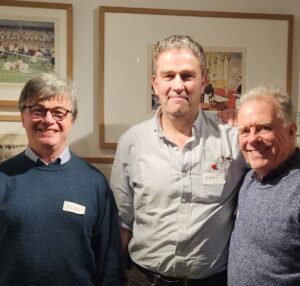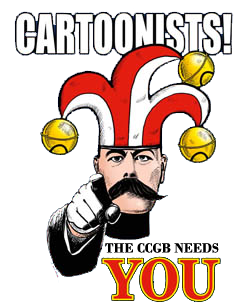
Your reviewer (left) with fellow CCGB members Rupert Godesen and John Landers (right). Photo: Leo Ioviero
The third annual Cartoon Museum conference took place on 26 February. I’ve attended all of them but had it not been for the opportunity to meet a couple of our members for the first time I am not sure that I would have thought this year’s event worthwhile.
The two regular speakers, Nicola Solomon from the Society of Authors and Derek Brazell from the Association of Illustrators were – as ever – good value on nuts-and-bolts topics like copyright, fees, contract negotiation and so forth. New to the line-up was David Leach (senior creative editor at Titan Comics) who was particularly engaging. He delivered his presentation without a script or slides, but with bags of enthusiasm. He established a good dialogue with the audience and was full of no-nonsense down-to-earth advice for the would-be comic and graphic-novel creator. I got the feeling that it is that side of the business (not single-panel gag work) where the centre of gravity of the audience lay, and certainly that is what all the other speakers focussed on.
David’s avoidance of visual aids was just as well because the Cartoon Museum has so far failed to address their inadequate projection system and layout, which marred all three conferences. The inset photo, taken from the second row of the audience, shows the issue.
There was a panel discussion about the ‘class ceiling’ which stops people from poorer sections of the community from breaking into the cartooning industry. Chaired by Natasha Khan of the Creative Mentoring Network, it drew some lively and helpful contributions from the audience. CMN’s mentoring was credited with developing people’s confidence, which is one important barrier, while the issue of money was addressed here and in other sessions by useful signposting towards grants. For other impediments like lack of time and mental wellbeing no solutions were forthcoming but tellingly David Leach, speaking as an editor, said he neither knew nor worried about an artist’s background or circumstances, while two of the published authors actually credited personal crises like cancer diagnoses and bereavement as things that drove their creativity. However, without wanting to be unkind, I found myself feeling that the audience is sometimes being co-opted as a therapist.
The first two conferences had celebrity speaker (Martin Rowson and Posy Simmonds) but nobody of that calibre appeared this year. Chairing was ineffectual and as a result timekeeping suffered. The gathering thinned appreciably just before 6pm with the last speaker still waiting to go on. And would it really be too much trouble to print delegate badges in advance rather than have people write their own on blank sticky labels?



No comments yet.